Karelia UAS’s Business Academy (Y-akatemia) is proud to host international visitors throughout the academic year. This past spring was no different, as the Business Academy was glad to host three different delegations from all over the world, from France, Tanzania and Canada. Even though each visit was unique in their own way, they all included similar goals: exchange knowledge and best practices, get students to meet and network with international students, broaden perspectives in pedagogical methods as well as showcase Karelia UAS and Business Academy as a long-term strategic partner. As part of the Business Academy, students have the possibility of participating in the international team (within the Business Academy). During these visits, the students (in the international team) were responsible for welcoming the visitors, planning activities as well as the agenda, in cooperation with the team coach.
Student and Staff Visit from IUT Valence
The first visit of 2024 was five students and one staff member from IUT Valence, France. As the group arrived during Easter, the visitors were able to see how quiet the city is during the holidays. During the visit, key takeaways were visiting Kuhasalo Hut, experiencing an international dialog, and hosting a winetasting for our students.
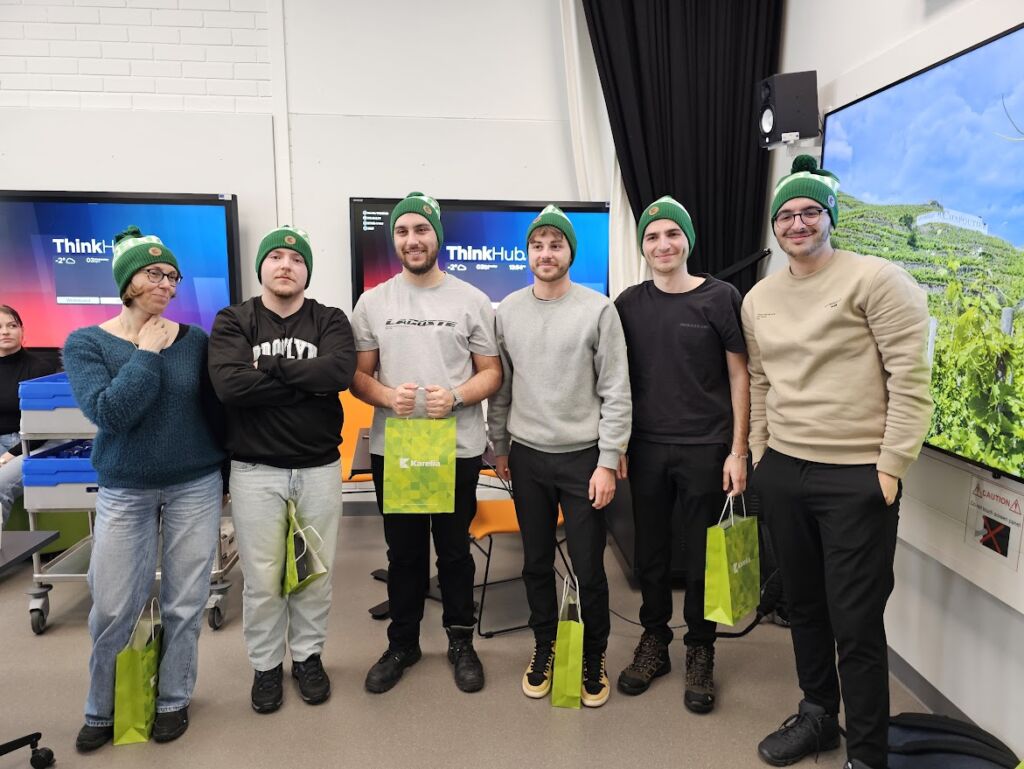
Business Academy students and staff organized a free-form activity for Easter Monday to visit Kuhasalo Hut. Here, the French students were able to walk on Lake Pyhäselkä, as there was plenty of ice over the lake. The weather was accommodating as well, as there was still plenty of show on the ground for our visitors to see Joensuu “in the winter time”, even though the majority of the snow had already melted at this point in the year. The French visitors were able to learn how to make a traditional fire, making feather sticks to kindle the fire as well as using a tinderbox to light the feather sticks. Over the open fire, traditional sausages were grilled and coffee was brewed. The rest of the afternoon, students practiced making their own feather sticks, out of logs and lighting them with a tinderbox. The evening was crowed by a visit to the Polar Bears Ice Swimming facilities where everyone had the possibility to go ice swimming and sauna.
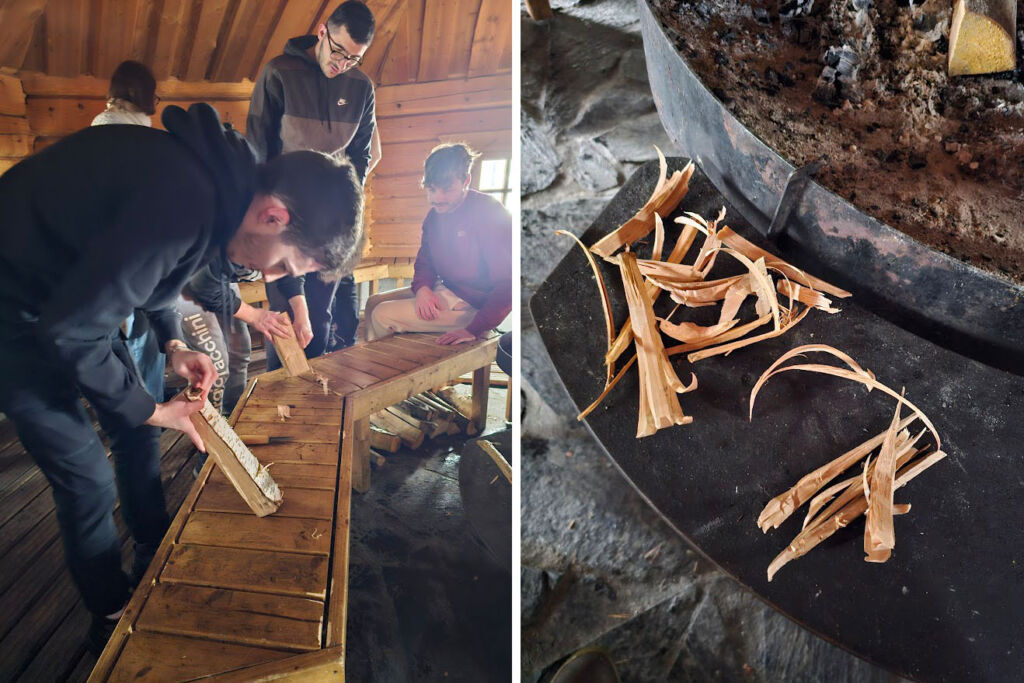
Once students returned on campus after the Easter break, Business Academy activities resumed. The French students presented their university to us, and the Business Academy students held an international dialog. Here students were able to share their own knowledge, expertise and insight into the topic of team learning. By participating in an international dialog with our Business Academy students, the French students and teacher were able to gain insight into team pedagogical methods used at the Business Academy.
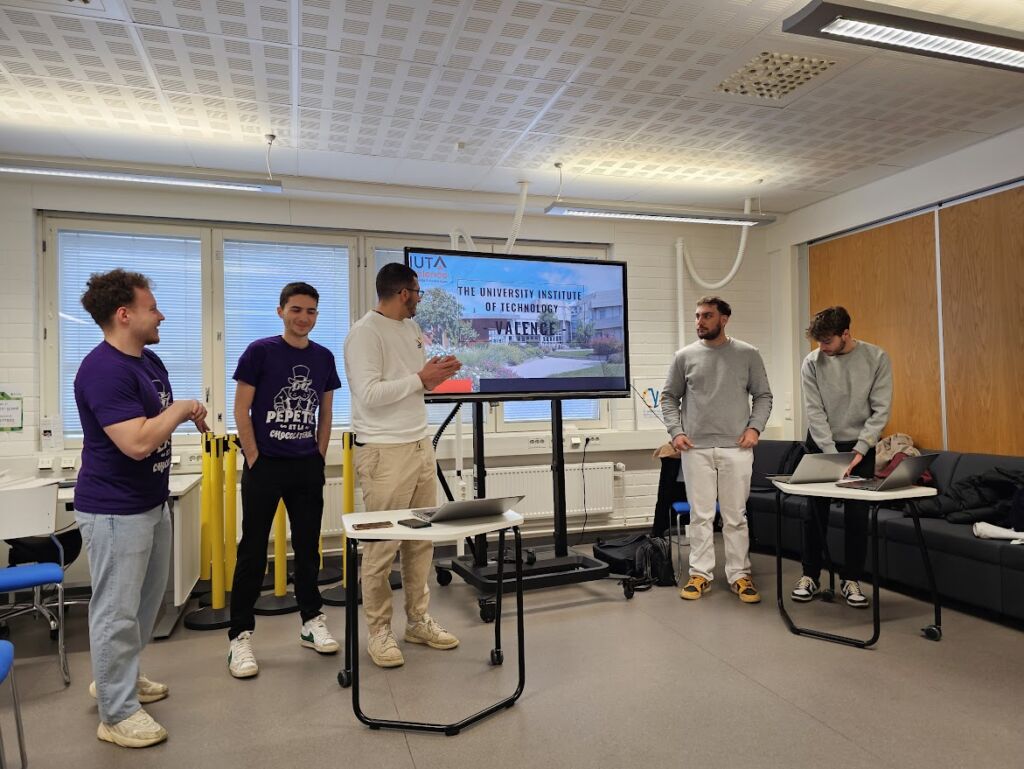
Finally, the French delegation hosted a wine tasting event for the Business Academy, which hosted the highest participation of students and staff. The event was very well organized and presented, with small snacks and descriptions of the wines available. This was a fantastic way to end the visit, as the students continued their networking after official study time.
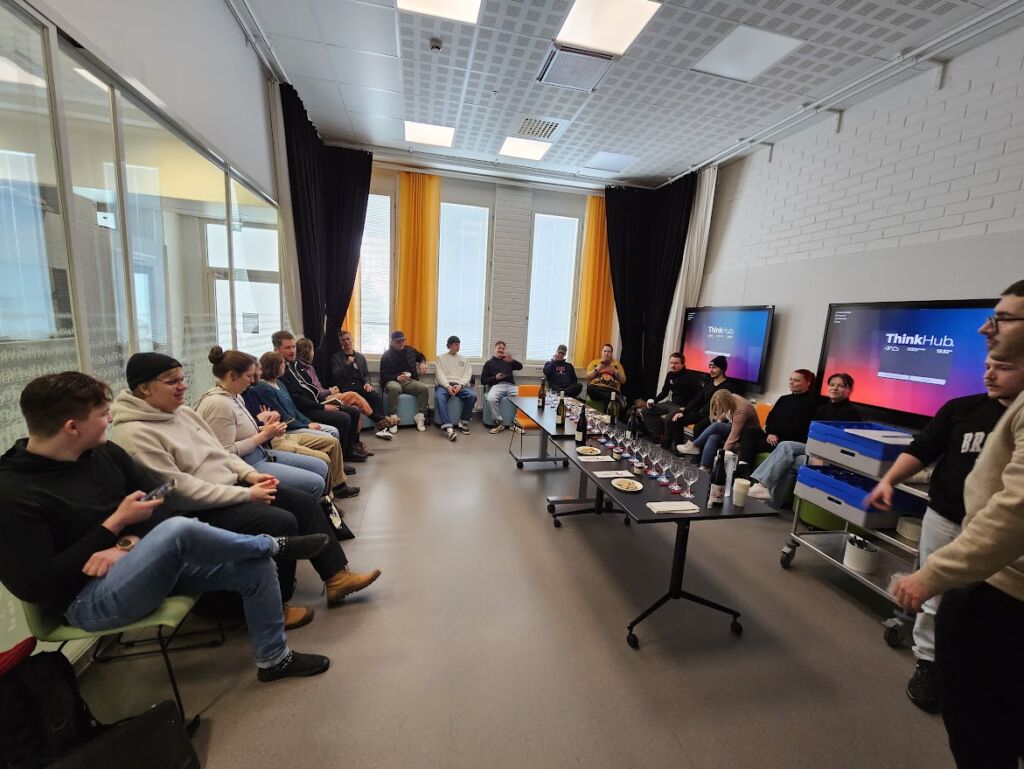
The main takeaway from this international visit was how similar students are to each other. And regardless of language proficiency, all students managed to communicate with each other in one form or the other. This highlighted the importance of just being brave enough to open one’s mouth and communicate with others. It’s surprising how quickly one can learn from others when given the opportunity and one takes it. Many students discussed the possibility of future visits, for example Business Academy student exchanged contact info and plan to visit their counterparts in the future.
Staff Visit from Iringa University
A few weeks after our French visit, we had the pleasure of hosting two staff members from Iringa University, Tanzania. This delegation visit was part of a longer cooperation joint project where staff members have the possibility to visit each partner organization and learn from each other team academy methods. As Iringa University also has a team academy at their university, it is essential to share know-how and knowledge how each other’s university adapts to this pedagogical method. Even though the main target audience was staff mobility and cooperation, the students of Business Academy were highly involved in the cooperation visit.
The visitors were able to partake in an international dialog, with Business Academy students, themed “Measuring in Teams and Business”. Here, Business Academy students were able to hear input from the Iringa delegation how their students partake in dialogs as well as insight into how different viewpoints are shared.
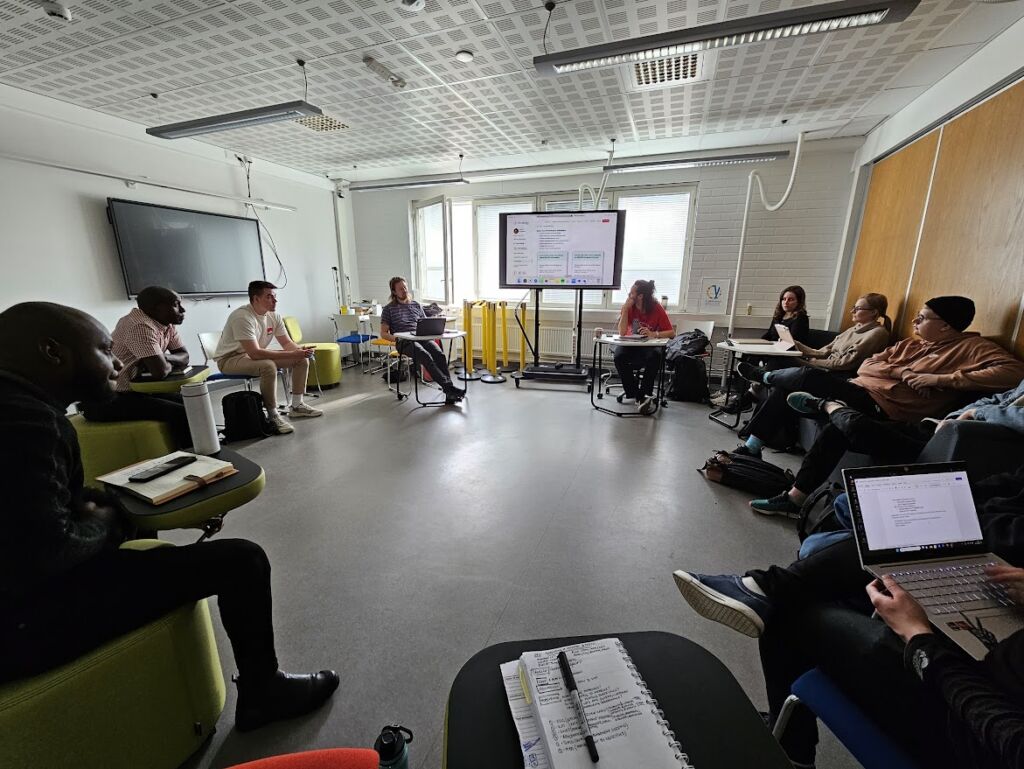
One main capacity building activity during the visit included sharing how studies are traced in the Business Academy, what kinds of facilities are available for Karelia UAS students, as well as what technological instruments are used on a daily basis. This was eye opening for us as well, to remember to thankful for the quality infrastructure that is available for us staff and students. One main difference was the accessibility of the internet. As it is highly expensive to use the internet in Tanzania, it is not common to have online platforms, such as Microsoft Teams as a learning environment, as it would put students on an uneven playing field.
During their visit, Finland’s Labor Day (Vappu) landed during their stay. This allowed our visitors to enjoy some free time and see how this holiday is celebrated in Finland. This was a fun juxtaposition compared to the French visit, as during Easter there are not many shops open or people out in public, compared to Labor Day, when everyone is joyously out and about in the city center.

Future cooperation will continue with two future international visits from Iringa to Karelia and minimally one international visit from Karelia to Iringa in the upcoming years. This will strengthen and enhance our cooperation.
Student and Staff Visit from Nipissing University
The final international visit of the semester came from Nipissing University, Canada. Here, 10 students and 2 staff members visited the Business Academy as well as other departments at Karelia UAS. This international visit was part of a long-term cooperation venture, which the subsequent universities hope to continue in the future.
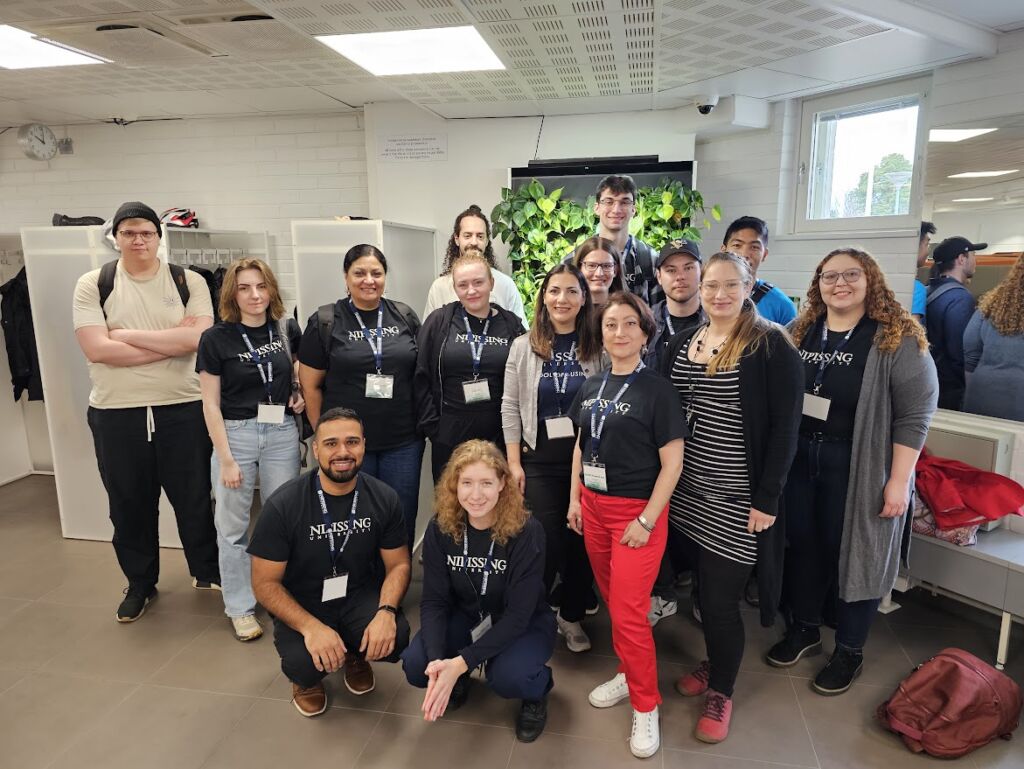
The activities during the Canada visit shared similarities with the French delegation, with individual differences. Part of the sharing knowledge agenda, Business Academy students hosted an international dialog, visited different areas of our campuses, as well as allowed for the Canadian visitors to host their own program. Also, during the evening, students decided to network outside of study hours, and spent time together in different groups to get to know each other more.

One of the main different activities during the Canadian visit included a visit to Koli National Park and local companies as well as an international seminar hosted by Karelia UAS’s students. The Koli visit was a highlight for all participants, as Karelia UAS’s students were able to partake in the excursion as well, enhancing joint cooperation. During the visit, students were able to meet local companies (Break Sokos Hotel Koli Kylä, Kahvila Lentävä Luuta & Villa Ora’s) and get to know the different sustainable practices each organization partakes in. Also, free time was scheduled to visit the sightseeing spots of Ukko-Koli, Akka-Koli and Paha-Koli. The stories and legends of the area fascinated the students and staff. This is a good reminder of how stories stay in the mind of visitors more likely than plain facts.
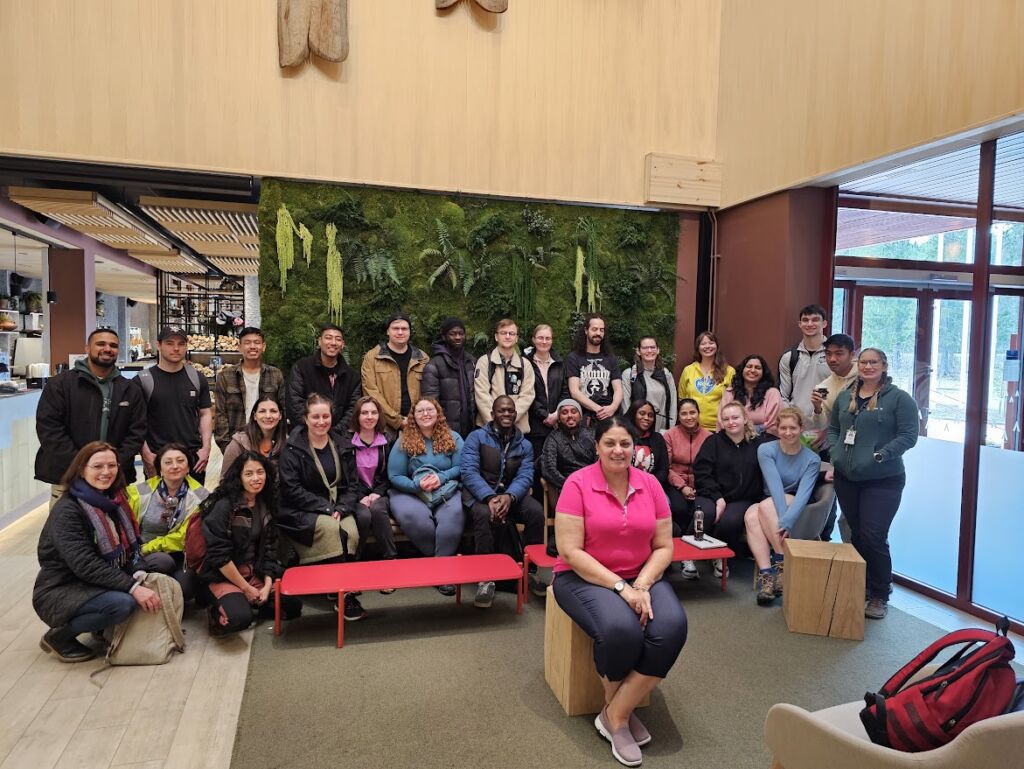
The visit was concluded with students and staff getting together at the end of the week to watch the Finland vs. Canada hockey game, which Finland unfortunately lost. But good times were had by all parties, and even a defeat in ice hockey didn’t deter students from making long-term friends and contacts for the future.
Conclusion
In recap, each international visit allowed for staff and students of each organization to learn from each other, cultural or pedagogical. By having these international visits, it allows for continuous learning for all parties and minimally gains new perspectives on ways of learning. By communicating with different actors, it allows for understanding to be enhanced and strengthens international ties to further cooperation in the future.
Written & all images by:
Riikka Räsänen, Lecturer & Business Academy Team Coach, Karelia UAS

